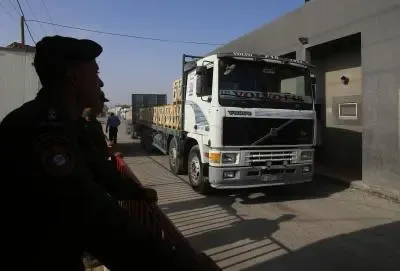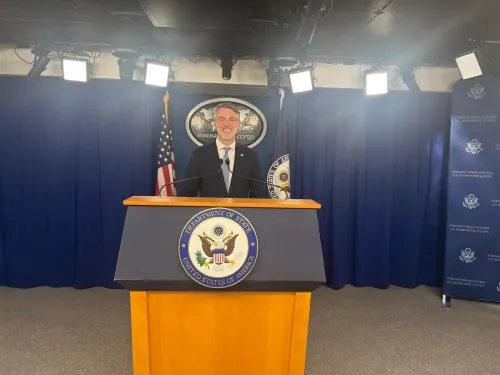Is the First Fuel Shipment in 130 Days Enough for Gaza?

Synopsis
Key Takeaways
- First fuel shipment in over 130 days only partially meets needs.
- Critical shortages threaten clean drinking water for thousands.
- UN agencies emphasize the need for immediate assistance.
- Continuing violence hampers humanitarian efforts.
- International law mandates protection for civilians.
United Nations, July 11 (NationPress) The initial shipment of fuel delivered to Gaza after over four months is merely a fraction of what is required to address the dire needs of the fuel-deprived region, impacting essential services such as hospitals and water supply, according to UN humanitarian officials.
The 75,000 liters of fuel permitted by Israeli authorities for entry into the Gaza Strip on Wednesday falls short of meeting even a single day's requirements, which are estimated to be in the hundreds of thousands of liters, as stated by the UN Office for the Coordination of Humanitarian Affairs (OCHA).
“The fuel crisis continues to worsen in the strip, and without significantly larger shipments, services will cease,” OCHA warned. “One organization reported that within days, fuel shortages could threaten clean drinking water supplies for around 44,000 children in Gaza, heightening the risk of waterborne diseases like cholera, diarrhea, and dysentery.”
Nevertheless, fuel is just one of numerous challenges faced by the region, as reports of death, destruction, and displacement persist daily, while hopes for a potential ceasefire linger.
UNICEF disclosed that on Thursday, 15 Palestinians, including nine children and four women, were reportedly killed while waiting for children's nutritional supplements during an assault in Deir al-Balah. UNICEF Executive Director Catherine Russell remarked that 30 others, including 19 children, sustained injuries, as reported by Xinhua news agency.
“The killings of families seeking life-saving assistance are intolerable,” Russell stated. “These were mothers desperately trying to secure sustenance for their children after enduring months of hunger and hardship.”
OCHA emphasized that all parties involved in the conflict are obligated under international humanitarian law to prevent excessive civilian casualties and must implement all possible measures to minimize harm, as indiscriminate attacks remain strictly forbidden.
Furthermore, OCHA reported that another airstrike hit the office of a humanitarian organization in Gaza City, resulting in the deaths of three staff members.
According to the World Health Organization (WHO), from the onset of the Gaza conflict in October 2023 through the end of June, over 740 attacks have impacted 125 health facilities in the region, including 34 hospitals and 188 ambulances.
The WHO also highlighted that more than 485,000 individuals in Gaza are grappling with mental health issues, and at least 500,000 women of reproductive age lack access to essential healthcare services, such as prenatal and postnatal care, family planning, and management of sexually transmitted infections.
OCHA reported that its partners in education have established 626 temporary learning spaces in Gaza between October 2023 and June 2025, enrolling 240,000 students, nearly half of whom are girls. However, only 299 of these spaces are currently operational due to issues like displacement orders and funding shortages.
The operational spaces can accommodate 113,000 students and 3,250 educators, offering them a semblance of educational continuity and physical safety.
Despite overwhelming conditions, OCHA responders, healthcare workers, and aid personnel continue to provide food and other essential support, all while facing hunger, water shortages, and threats to their safety—just like the rest of the population in Gaza.
“This disastrous situation must be addressed,” the office stated. “A ceasefire is not only urgent; it is long overdue.”
In the West Bank, OCHA continues to raise alarms about the escalating operations by Israeli forces in northern regions, resulting in extensive destruction, increasing humanitarian needs, and diminishing hopes for numerous displaced families wishing to return home.
The office also noted that attacks, harassment, and intimidation by Israeli settlers against Palestinians have become an everyday occurrence, including a settler attack on July 3 that displaced the Al Mu'arrajat East Bedouin community in the central West Bank.
“Children in this community risk losing educational access as settlers invaded the community school, vandalized property, and sprayed anti-Palestinian graffiti,” OCHA reported. “The school, which previously served over 70 students and has faced demolition threats for years, now stands empty.”
The humanitarian office indicated that this community is the ninth to be entirely displaced in the Ramallah and Jericho areas since January 2023, following repeated assaults by Israeli settlers, with another four communities in the region facing a high risk of displacement due to ongoing settler violence and access restrictions.









